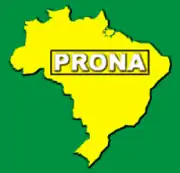Party of the Reconstruction of the National Order
The Party of the Reconstruction of the National Order (Portuguese: Partido de Reedificação da Ordem Nacional, PRONA) was a nationalist political party in Brazil. Its electoral code was 56 and its colors were the traditional Brazilian green and yellow. It was founded in 1989 by the professor and politician Enéas Carneiro, who was the president of the party.[5] Its political broadcasts during the pre-election campaigning periods became famous and distinct for the speed in which they were produced due to the very short time the party had available and also because of the use of Beethoven's Fifth Symphony as soundtrack.
Party of the Reconstruction of the National Order Partido da Reedificação da Ordem Nacional | |
|---|---|
 | |
| President | Enéas Carneiro |
| Founded | June 20, 1989 |
| Dissolved | 2006 |
| Merged into | Republic Party |
| Headquarters | SCN Qd. 1, Bl. E, nº50, sala 114 Ed. Central Park - Asa Norte Brasília |
| Ideology | Brazilian nationalism[1] National conservatism Social conservatism Economic nationalism Anti-communism |
| Political position | Right-wing[2][3] to far-right[4] |
| Colours | Green and yellow |
| TSE Identification Number | 56 |
| Website | |
| www.prona.org.br | |
The party was strongly identified with the figure of Enéas, who was candidate to the presidency of Brazil in 1989, 1994 and 1998.[5]
The party was extinguished in 2006, shortly before the death of Enéas, being succeeded by the Party of the Republic.[6]
Corruption
The Electoral Corruption Movement, based on data released by the Superior Electoral Court on 4 October 2007, released a balance sheet containing parties with the largest number of members of the judiciary who had been expelled for corruption since the year 2000. PRONA appeared in last place, with a single expel, tied with the Humanist Party of Solidarity, Green Party and Progressive Republican Party.[7]
References
- Power, Timothy J. (2000), The Political Right in Postauthoritarian Brazil: Elites, Institutions, and Democratization, Pennsylvania State University Press, p. 95
- Caldeira Neto, Odilon (2016). As “novas direitas” e a fundação do Prona (PDF). Porto Alegre, Brazil: UFRGS - Instituto de Filosofia e Ciências Humanas, Departamento de História. p. 44.
- Caldeira Neto, Odilon (2016). "A "DIREITA ENVERGONHADA" E A FUNDAÇÃO DO PARTIDO DE REEDIFICAÇÃO DA ORDEM NACIONAL". Historiæ, UFRGS. Retrieved 10 April 2019.
-
- Handlin, Samuel (2017). State Crisis in Fragile Democracies: Polarization and Political Regimes in South America. Cambridge University Press. p. 126. ISBN 978-1108415422.
- Matos, Carolina (2008). Journalism and Political Democracy in Brazil. Lexington Books. p. 295.
- Deutsch, Sandra McGee (1999). Las Derechas: The Extreme Right in Argentina, Brazil, and Chile. Stanford University Press. p. 323.
- Mainwaring, Scott; Meneguello, Rachel; Power, Timothy J. (2000). Conservative Parties, Economic Reform, and Democracy in Brazil. Johns Hopkins University Press. p. 180.
- Esteves Galvão Lopes, Guilherme (2016). Enéas Carneiro e o PRONA: nacionalismo e conservadorismo no Brasil pós-ditadura militar. Universidade do Estado do Rio de Janeiro. p. 1.
- Power, Timothy J. (2000). The political right in postauthoritarian Brazil : elites, institutions, and democratization. University Park, Pa.: Pennsylvania State University Press. ISBN 978-0585380889. OCLC 48140088.
- Associated Press (May 7, 2007). "Eneas Carneiro; ran for president in Brazil". The Boston Globe. Retrieved November 24, 2018.
- Couto, André. "Partido de Reedificação da Ordem Nacional (PRONA)". Centro de Pesquisa e Documentação de História Contemporânea do Brasil (CPDOC) (in Portuguese). Retrieved November 21, 2018.
- "Estatuto do Partido da República". partidodarepublica.org.br. Retrieved November 21, 2018.
- O Globo Online (October 4, 2007). "Desde 2000, 623 políticos foram cassados. DEM lidera ranking, diz pesquisa". Extra (in Portuguese). Retrieved November 21, 2018.
External links
| Preceded by 55 - SDP (PSD) |
Numbers of Brazilian Official Political Parties 56 - PRNAO (PRONA) defunct |
Succeeded by 65 - CPofB (PCdoB) |